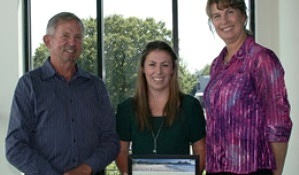
Dr Stella Frances scholarship winner
Scholarship winner Alicia Catlin, with Waikato Conservation Board chair Arthur Hinds and Waikato Regional Council chairperson Paula Southgate, wants to make a difference through her research on whitebait food supplies. Image supplied
Research being undertaken by a Waikato university student will help to protect populations of one of New Zealand’s most popular delicacies, says Waikato Regional Council.
Alicia Catlin has won the $5000 Dr Stella Frances Scholarship from Waikato Regional Council and the Department of Conservation and will be using it to research the effects of floodplain inundation on whitebait food supplies.
As part of her research, Hamilton-based Ms Catlin will collect whitebait between August and December, returning to the lab to do dissection.
“It is important to know whether whitebait are deriving the zooplankton from the main river channel or lateral floodplain areas,” explains Ms Catlin, who is formerly from the Walton/Matamata area.
“If they are selecting zooplankton from the floodplain areas over the river channel and the floodplains get disconnected, for example due to stopbanks or flood gates, they will lose this food supply which could dramatically affect their populations.
“Knowing what they feed on will allow organisations to know where to focus their management of whitebait in terms of restoring connectivity with lateral floodplain areas, as well as restoring vegetation in these areas to support vital zooplankton generation,”
“The results of my research will also educate the wider public on how they can further help whitebait populations to continue into the future,”
Freshwater zooplankton are unicellular and multicellular animals found in the water in wetland areas such as lakes, tarns, streams and swamps and are a main source of food for whitebait and other aquatic organisms.
Regional council chairperson Paula Southgate said: “Alicia’s work is highly relevant to the Waikato region, where water quality is the big issue that we face going forward. This research will help to address this priority environmental issue, as well as river restoration, and traditional and commercial food sources.”
Waikato Conservation Board chair Arthur Hinds said: “Stella would have really appreciated the passion that Alicia shows for the environment and her work as part of the next generation of conservationists.”
The council heard that Ms Catlin has a “desire to make a difference through her research and an ongoing commitment to science”.
The Dr Stella Frances Scholarship was initiated in 2005 in memory of the well-known and highly respected environmentalist, regional councillor and conservator for DOC who died in August 2003.
The $5000 grant from Waikato Regional Council and the Department of Conservation is awarded to defray the expenses of Masters-level research and study in the fields of natural and physical sciences, human perspectives on the environment, environment management practice or economics and technologies.
